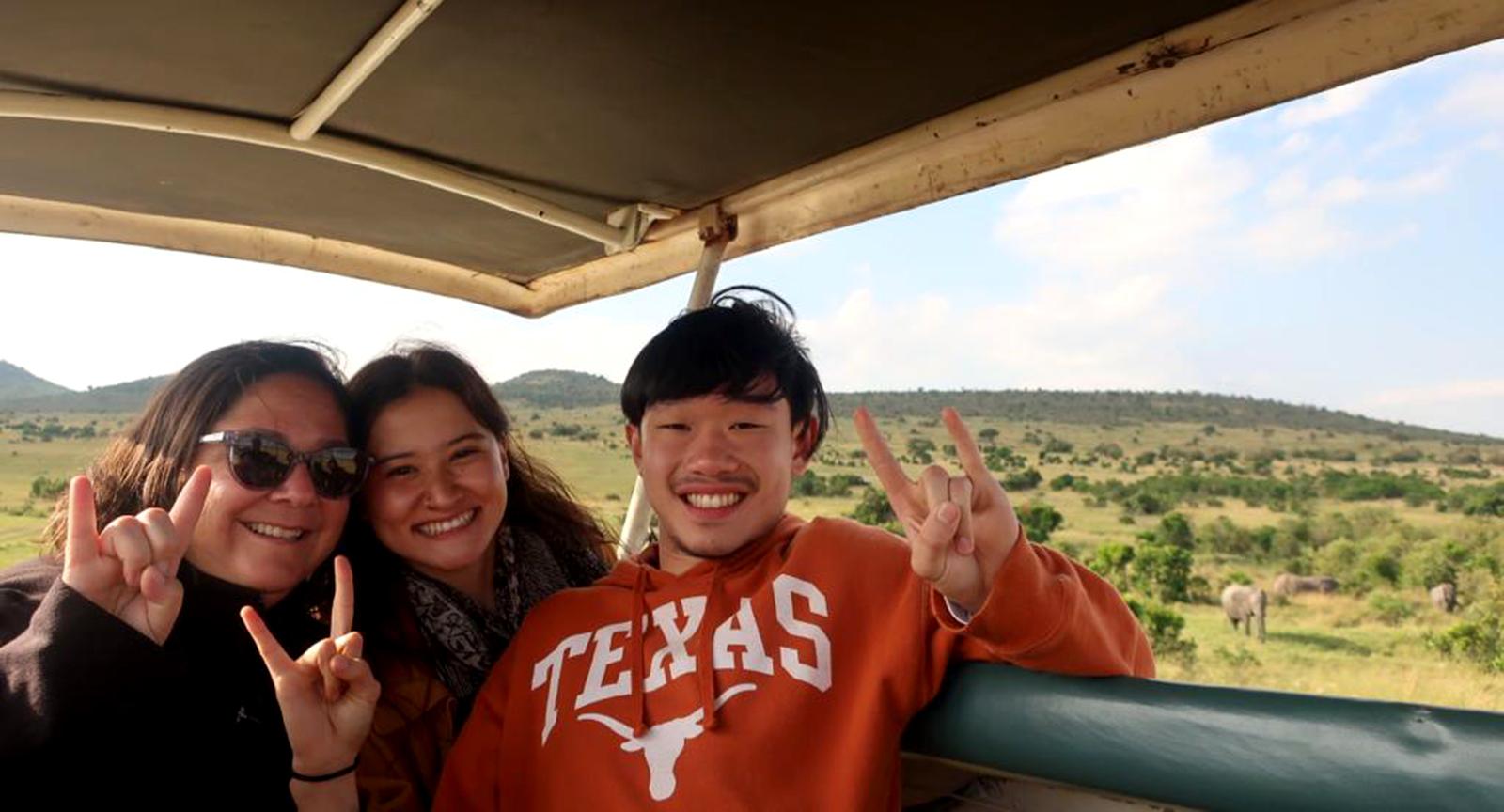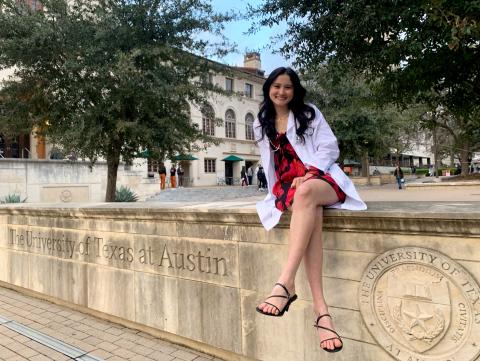
School of Nursing faculty encourage students to present their research and apply for conferences. As a nursing student, senior Arielle Warren has taken advantage of these opportunities and has presented her research locally and abroad.
Warren first presented her research “Global Health Education Through Binational Collaboration on Systematic Reviews of the Literature” at the UT Medical Branch’s Global Health Symposium in Galveston, Texas, in October 2023. She met and learned from global health experts and public health researchers and instantly understood the value of presenting research.
Additionally, Warren has presented her research at local conferences hosted by UT Austin, including an oral presentation titled “The Influence of Caregiver Knowledge of Childhood Asthma Management on Health Outcomes in Low-and-Middle Income Countries: A Systematic Review” at the Capital of Texas Undergraduate Research Conference in March 2024.
Her research “Multi-Modal Advancements in Wound Care using an Interdisciplinary, Binational Approach in Western Kenya” was accepted as a poster presentation for the Interprofessional Health Showcase in April 2024, receiving 2nd place in the Best in Health Innovation category.
Julie Zuñiga, PhD, RN, FAAN, associate professor, encouraged Warren to apply to present her findings at the Sigma Theta Tau 35th International Nursing Research Congress in Singapore in July 2024, funded by an Undergraduate Research Fellowship award. Warren gave an oral PechaKucha presentation, meaning chit-chat in Japanese, titled “Investigating Barriers and Facilitators to Wound Care in Sub-Saharan Africa,” as well as a poster presentation titled “Enhancing Global Health Education Through Binational Collaboration on Systematic Reviews of the Literature.”
The theme for this year’s Sigma conference was “Sharing Insights, Advancing Care: Disseminating Nursing Research and Evidence for the Future.” Warren said she was excited to learn from nurse researchers and fellow students from around the globe and learn more about the research process. She also saw this as an opportunity to improve her presentation and public speaking skills.
“It means a lot to me to have been able to travel to Singapore for this conference, and I am honored to have been accepted,” Warren said. “This is something I have been dreaming of for a long time, and I am very grateful for the School of Nursing’s support.”
Researching wound care and prevention

Warren’s research was originally developed through the UT President’s Award for Global Learning (PAGL) as part of the Wound Care in Kenya program.
In July 2023, a team of 14 undergraduate, interdisciplinary students from UT Austin traveled to Kenya for two weeks, where they started data collection. It was through this in-person opportunity that Warren was able to connect with students and faculty from Moi University in Kenya to begin her global health research. The first couple of meetings for the systematic reviews occurred in person in Kenya to establish the team and develop research questions.
Both of Warren’s studies are in collaboration with Moi University and Moi Teaching and Referral Hospital (MTRH) based in Kenya, as part of the Academic Model Providing Access to Healthcare Consortium (AMPATH). Wounds were identified by the AMPATH partners as an urgent issue at MTRH.
The purpose of her research on wound care is to learn about current practices and wound care resources, as well as investigate how barriers affect how health care professionals and community members approach wound care in Sub-Saharan Africa to inform efforts to facilitate greater access to quality wound care.
The interdisciplinary team is made up of five undergraduate UT Austin students studying neuroscience, biology, mechanical engineering and liberal arts, and two nursing students and one medical student from Moi University, as well as two faculty mentors, one from each institution. They gathered data using online surveys, online interviews over Zoom and in-person interviews, asking 16 open-ended questions regarding barriers to wound care. This study was approved by UT Austin’s Institutional Review Board and Moi University’s Institutional Research Ethics Committee.
The data analysis process is ongoing. The team has gathered results from 28 participants and interviews. Early research suggests that wound care faces challenges like high supply costs, lack of protocols, inadequate staffing, knowledge deficits, antimicrobial resistance and mental health issues for providers.
Additionally, Warren said several of their participants mentioned the theme of “the wound speaks,” meaning the wound dictates the treatment plan as each patient and scenario is unique. Facilitators of wound care include a trusting patient-provider relationship, evidence-based practices, interdisciplinary collaboration, proper nutrition and hospital policies.
Collaborating for global health
Global health education encourages collaboration to promote research and innovation for international health challenges. For the binational collaboration study, the teams engaged in collaborative systematic reviews to train junior faculty, educate leaders and share global health information. These reviews addressed disease management and prevention in low-to-middle-income countries and Sub-Saharan Africa.
Warren said this research advances health science by utilizing the skills of junior colleagues and encourages global health concerns.
To date, Warren has had the opportunity to work on three literature reviews with this team, with two of them to be completed by fall 2024: “Influence of Heart Failure Knowledge on Self-Care Behaviors of Patients with Heart Failure in SSA–A Systematic Review” and “Influence of Caregiver Knowledge of Home Asthma Management on Health Outcomes of Children in Low- and Middle-Income Countries: A Systematic Review.”
Additionally, the team is looking at how tactile-kinesthetic/massage therapy influences growth, development, neurological and physiological outcomes of preterm neonates through another systematic review of the literature.
Hope for global health
While presenting her research at the Sigma conference, Warren said her goal was to disseminate this work to fellow nurses to improve patient outcomes and bring awareness to the need for further wound care research and funding.
“I hope I was able to motivate more institutions to establish a reciprocal and sustainable global health relationship following the AMPATH model,” Warren added. “I also hope I was able to inspire fellow nursing students to get involved in research and understand its value.”
“The more research I involve myself in, the more rewarding it is,” she continued. “With each new study comes more opportunities to travel, to learn and to contribute even more. As students, it is important to take charge of our education and find what we are passionate about. I can take the data and knowledge that we have been collecting and apply it to my patients. By gaining a deeper understanding of evidence-based practices, I can apply them in the hospital, which in turn, makes me a better student nurse.”
Warren expressed how grateful she is to Zuñiga, who serves as the faculty mentor for PAGL, for the countless opportunities to further her education by expanding her worldview and understanding of global health.
“I am so proud of Arielle’s work as a leader for a multidisciplinary binational team of undergraduate students,” Zuñiga said. “Her works highlight the incredible capabilities of our students. Above and beyond her own classwork and clinical work, Arielle wakes up very early to work with our Kenyan counterparts on several different projects. She has done amazing work and never backs down from a challenge. I’m so excited to see what the future holds for her in nursing.”
“Dr. Zuñiga serves as an embodiment of an excellent educator and mentor, and she is the reason I am now passionate about nursing research and global health,” Warren added.
Passion for health care
Warren’s passion for health care started when she was a little girl. While in high school, she had the opportunity to shadow and learn from nurse practitioners, which quickly solidified her love for nursing.
“Nursing is a calling as much as it is a profession, and it is one that I am proud to be a part of,” she said.
Through the variety of the School of Nursing’s clinical experiences, Warren said she had been able to apply knowledge learned in the classroom to real patients and loves how, in nursing, there are always more opportunities to learn.
“Being a Nursing student is a privilege, and I am very grateful for all the opportunities the School of Nursing has provided me,” she added.
As a nursing student, Warren said she has been able to apply knowledge learned in the classroom to real patients through the variety of the School’s clinical experiences.
“Health care is an ever-evolving field, and, with nursing research, we can contribute to the current existing knowledge to improve care for our patients,” she concluded. “Being able to help people for a living is extremely rewarding, and it is a constant reminder that it is a privilege to be able to do so. Every day is an opportunity to challenge myself and apply the nursing values of care and compassion for others outside of school and work.”